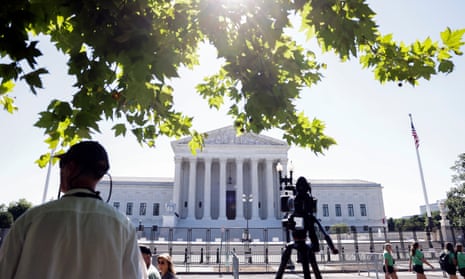In remarks to the first Earth Day gathering in 1970, the Maine senator Edmund Muskie made the case for the Clean Air Act – a bill he helped draft – in stark terms. “There is no space command center, ready to give us precise instruction and alternate solutions for survival on our spaceship Earth,” he told the crowd. “Our nation – and our world – hang together by tenuous bonds which are strained as they have never been strained before – and as they must never be strained again. We cannot survive an undeclared war on our future.”
In its Thursday ruling on West Virginia v EPA – in line with a string of decisions that will make life here more dangerous – the US supreme court all but declared that war, curtailing the Environmental Protection Agency’s ability to regulate power plants under a provision of the Clean Air Act and – more worryingly – striking an opening blow to the government’s ability to do its job.
It hasn’t done so alone. The foundations for today’s ruling, like the other disastrous ones delivered this term, were laid well before Muskie gave his speech in Philadelphia. Along with the Clean Water Act, the Clean Air Act – passed during the Nixon administration – was a last gasp of the New Deal order, putting the government to work on an audacious and unprecedented task. Muskie hoped, as he said that day, that it might bring about “a society that will not tolerate slums for some and decent houses for others, rats for some and playgrounds for others, clean air for some and filth for others” through “planning more effective and just laws and more money better spent”.
That approach to governance is precisely what a coterie of rightwing philanthropists and legal activists found so threatening, and why they became a core part of the right’s decades-long crusade against the kinder, bigger state.
The crowning achievement of that crusade was the election of Ronald Reagan, who proved to be a useful cipher for fossil fuel-funded thinktanks and neoliberal economists to get their message out. It was none other than Justice Neil Gorsuch’s mother who helped Reagan try to strip the federal government’s environmental protection apparatus for parts. As Reagan’s pick to lead the EPA, Anne M Gorsuch made it her personal mission to shrink the body tasked with enacting the Clean Air Act. She railed against what she described as a “set of commands from Congress”. Looking back on her term, Gorsuch – who slashed the agency’s budget by a quarter – took pride in having helmed the “only agency in Washington that was truly practicing New Federalism”, devolving as many of its responsibilities as possible down to the states. Following in her footsteps, Judge Gorsuch has railed against the Chevron Doctrine that’s been a main target of the conservative legal movement (not overturned today, thankfully), saying it allowed “executive bureaucracies to swallow huge amounts of core judicial and legislative power”.
But the roots of this ruling run deeper than Neil Gorsuch wanting to make mom proud. Polluters have always been happy to throw small fortunes at the right’s quest for minority rule, keen to protect fossil fuel profits and their ability to dump waste into the air and water from pesky things like democracy. As Nancy MacLean writes in Democracy in Chains, Charles Koch took a special interest in destroying public education, thus maintaining de facto segregation, before leading the charge against climate policy at every level of government. He continues to be a generous funder of the Federalist Society, an instrumental force in building and filling the pipeline of clerks, judges and cases that has created the judicial branch as we know it, and rulings like the one that overturned Roe v Wade last week. Secretive dark-money outfits like Donors Trust, as well as Chevron and the Scaife Foundation – furnished by old oil and aluminum money – have joined him.
West Virginia v EPA itself was brought with the help of the Republican Attorneys General Association, a network of state attorneys general whose own funders include the country’s biggest fossil fuel companies and the beleaguered coal barons who had the most to lose from the modest power plant regulations. They also spent $150,000 sponsoring Trump’s rally on 6 January.
The interests of the country’s wealthiest residents and corporations are at odds with the vast majority of people who live here. Luckily for the right, a political system designed by slaveholders provides an easy on ramp to concretize minority rule, encasing their power within definitionally undemocratic institutions. With a young, ideological rightwing majority on the court, there’s no telling how far they might go. And there’s not much that can stop them.
Gorsuch, ironically, put it well in his concurring opinion. But the line applies better to him and his colleagues than to the federal bureaucrats he was railing against: “a republic – a thing of the people – would be more likely to enact just laws than a regime administered by a ruling class of largely unaccountable ‘ministers’.”
Kate Aronoff is a staff writer at the New Republic and the author of Overheated: How Capitalism Broke the Planet – And How We Fight Back

